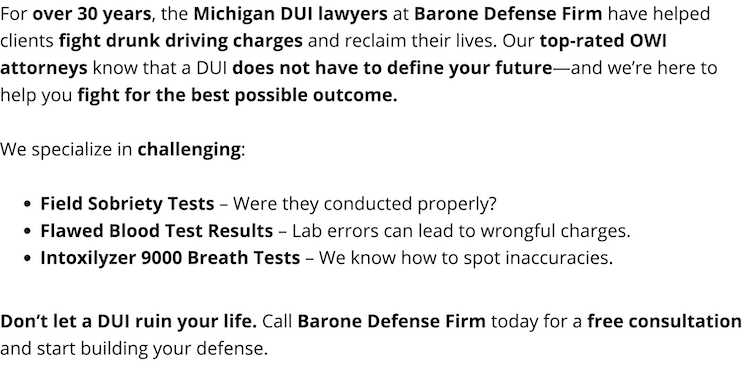Michigan OWI Can be Proved by Showing OUIL or UBAL at Trial
The principal crime for a first offense drunk driving is called “operating while intoxicated” or OWI. To prove this crime at trial a prosecutor can utilize two different but related theories. Either theory must be proved beyond a reasonable doubt, and the jury does not need to be unanimous as to which theory was proved.
The Common Law DUI theory of Operating Under the Influence of Intoxicating Liquor or OUIL
The principal crime of OWI can be proved using the theory of OUIL. To prove that a person was OUIL the prosecutor must show that the driver’s ability to operate was substantially lessened by the consumption of alcohol. The term “substantially lessened” is not defined, and it is up to the jury to decide whether the evidence produced by the prosecutor in fact proves, beyond a reasonable doubt, that the alcohol so impacted the driver.
The instruction about this OUIL theory indicates that being under the influence does not mean the driver cannot stand up or is “falling down drunk.” However, because drinking and driving is not illegal, simply drinking alcohol is also not sufficient. To prevail on this theory, the judge will tell the jury that the prosecutor must prove that because of using drugs or alcohol the driver was no longer able to operate their vehicle in a “normal” way.
To decide if the driver could no longer operate in a normal way, the judge will instruct the jury that they should consider things like the driver’s ability to walk, talk and see. The jury should also consider the driver’s reflexes, judgement, and ability to drive. The judge will tell the jury that if any of these things did not seem “normal” then “was this caused by drinking alcohol.” Or in a drug case “caused by the consumption of drugs.”
This OUIL theory of OWI is usually supported by the police officer’s testimony, including any description of the field sobriety tests administered. In most Michigan DUI cases there will also be video evidence from the roadside, and the jury will usually review this evidence as well. If there is a breath or blood test a jury can consider such test in deciding if this theory was proved, but the OUIL theory does not require a chemical test. This means a prosecutor has this theory available even when the driver refused testing or when a breath or blood test has been deemed inadmissible by a judge.
The Statutory Theory of Unlawful Bodily Alcohol Level or UBAL
If the prosecutor cannot prove that a driver was OUIL, they can still gain a conviction by showing that, at the time of operating, the driver had a bodily alcohol level at or above Michigan’s legal limit of.08. The UBAL theory of OWI requires that the jury find two things (1) that the breath or blood test is reliable, and (2) that the driver was at or above the legal limit at the time of driving. No other evidence is necessary.
The UBAL theory is available to a prosecutor even when a driver exhibits no signs of intoxication whatsoever. Even where a driver can walk and talk and drive completely normally they can still be found guilty of OWI if the jury believes the prosecutor has proved UBAL beyond a reasonable doubt.
This does not mean that a driver with a breath or blood test above the legal limit has no defense. The judge will instruct the jury that to return a verdict of guilty on a UBAL theory, they must determine that the test result is reliable. To make this determination, the judge will tell the jury to consider such things as whether the test was given correctly and if the person who gave the test was property trained. Also, whether the equipment used was properly set up, maintained and calibrated. Finally, in reaching their verdict the judge will tell the jury that they may give the test whatever weight they believe the test deserves, based on all the evidence presented at trial.
A Jury Need Not be Unanimous as to Which Theory is Proved
In general, jurors on criminal cases must be unanimous. However, in a DUI case this is not entirely true. This is because the judge will instruct the jury that they do not need to be unanimous regarding which theory of OWI the prosecutor proved. The jury must only be unanimous that at least one of the theories was proved. Misdemeanors are tried to a jury of six whereas felony drunk driving is tried to a jury of twelve. In a first offense DUI misdemeanor this means that three of the jurors might agree that the breath or blood test is not reliable, and therefore, that prosecutor has not proved the UBAL theory beyond a reasonable doubt. If that same three believe that the OUIL theory was proved, and the remaining three accept the test result and therefore the UBAL theory, then the jury would be unanimous that the crime of OWI occurred. This would produce a valid guilty verdict.
What Happens if the Jury is Not Unanimous?
Sometimes the jury will give the bailiff a note explaining to the judge that they are deadlocked. When that happens judges will often instruct them that they should make every reasonable effort to reach a verdict. Jurors are told to keep an open mind, to listen to their fellow jurors and to be willing to change their mind if they decide that they were wrong. The judge will also tell them that no juror should give up their own opinion about how the case should be decided. Also, that they should never give up their opinion just to reach a verdict. In the end their vote must be honest and in good conscious.
If the jurors cannot unanimously agree, and when even just one juror believes neither theory was proved the jury would be “hung.” In many instances such a DUI case would be tried a second time with a new jury. This is because double jeopardy does not apply to this circumstance. Double jeopardy only applies to unanimous juries. For a not-guilty verdict to occur, the jury must be unanimous that the prosecutor has failed to prove either theory of OWI.
A Jury May Also Consider Any Less Serious Crimes Charged
If the jury cannot arrive at a unanimous verdict relative to the OWI charge, the jury may consider the less serious crime of OWVI or Operating While Visibly Impaired. For this less serious crime to be available at least one party must request it. In most circumstances the prosecutor will request that the jury be allowed to consider the less serious crime of OWVI.
To prove that a driver’s ability to operate was visibly impaired by drugs or alcohol, the prosecutor must only present sufficient evidence that the driver drove with “less ability” than an ordinary careful driver. For the OWVI verdict, the jury must unanimously believe that the evidence has shown driving “bad” enough to be noticed by another person. The jury may consider all the same factors as they would consider for an OWI verdict it’s just that for an OWVI verdict the impact of the alcohol or drugs on the driving ability is less severe.
Also, like the OWI, the jury may consider any breath or blood test results in deciding if the prosecutor has met their burden of proof on the OWVI less serious theory. However, the OWVI is more like the OUIL theory in that no breath or blood test is required for the prosecutor to prevail. Like the OUIL theory, the OWVI theory is largely based on the observations and testimony of the arresting arrest.
There are Three Possible Guilty Verdicts and Only One Possible Not Guilty Verdict
The jury will be instructed that they should first try to reach a unanimous verdict on the more serious crime of OWI. If the jury finds that the driver is not guilty of this crime or cannot unanimously agree that either the OUIL or UBAL theory has been proved, then they should next consider the less serious crime of OWVI. It is up to the jury to decide how much time to spend deliberating over these three possible guilty verdicts. It is only if the jury also cannot agree that any of these three theories have been proved beyond a reasonable doubt that they may return a verdict of not guilty.
How Can a Person Defend Against the Various Theories of Drunk Driving in Michigan?
A person accused of DUI can, but is not required to, present evidence. This might for example include testimony from a doctor regarding a medical condition that may have impacted the driver’s ability, or the defendant may testify in their own behalf regarding medical conditions that might impact field sobriety test performance. Also, the defendant can call witnesses to establish how much or how little they had to drink or to provide an alternative view of their behavior at or near the time of the arrest. Expert witnesses can also be utilized to help show why the breath or blood test is not reliable.
Defending a DUI at trial also does not require witnesses. A perfectly valid and potentially successful defense might consist only of skillful cross-examination of the prosecution’s witnesses. This cross-examination may consist of methodically showing that an officer did not follow proper training and protocol in administering the field sobriety tests or in collecting the breath or blood sample. Such cross-examination is designed to help the jury understand that the prosecutor’s evidence is not reliable.
Because the defendant has no burden of proof at trial, they are not required to call witnesses or even cross-examine the prosecutor’s witnesses. A defendant literally could do nothing affirmatively to defend their case and could still win if the prosecutor’s case fails. It would be a rare DUI trial indeed where a defendant did nothing to contest the prosecutor’s case. Nevertheless, the judge will tell the jury that by law a defendant does not need to prove their innocence or produce any evidence.
Winning a DUI Trial is Never Easy
This discussion shows what a difficult task it is to win a DUI trial in Michigan. But it is not impossible. All the DUI lawyers at the Barone Defense Firm have won at trial and have done so using a combination of skill, knowledge, and experience. We know how to confront even the worst possible facts and persuasively show at trial why the prosecutor’s case fails. Each case is different, but our job is always the same - to look for the best path to victory for every individual client.
 Barone Defense Firm Home
Barone Defense Firm Home
















